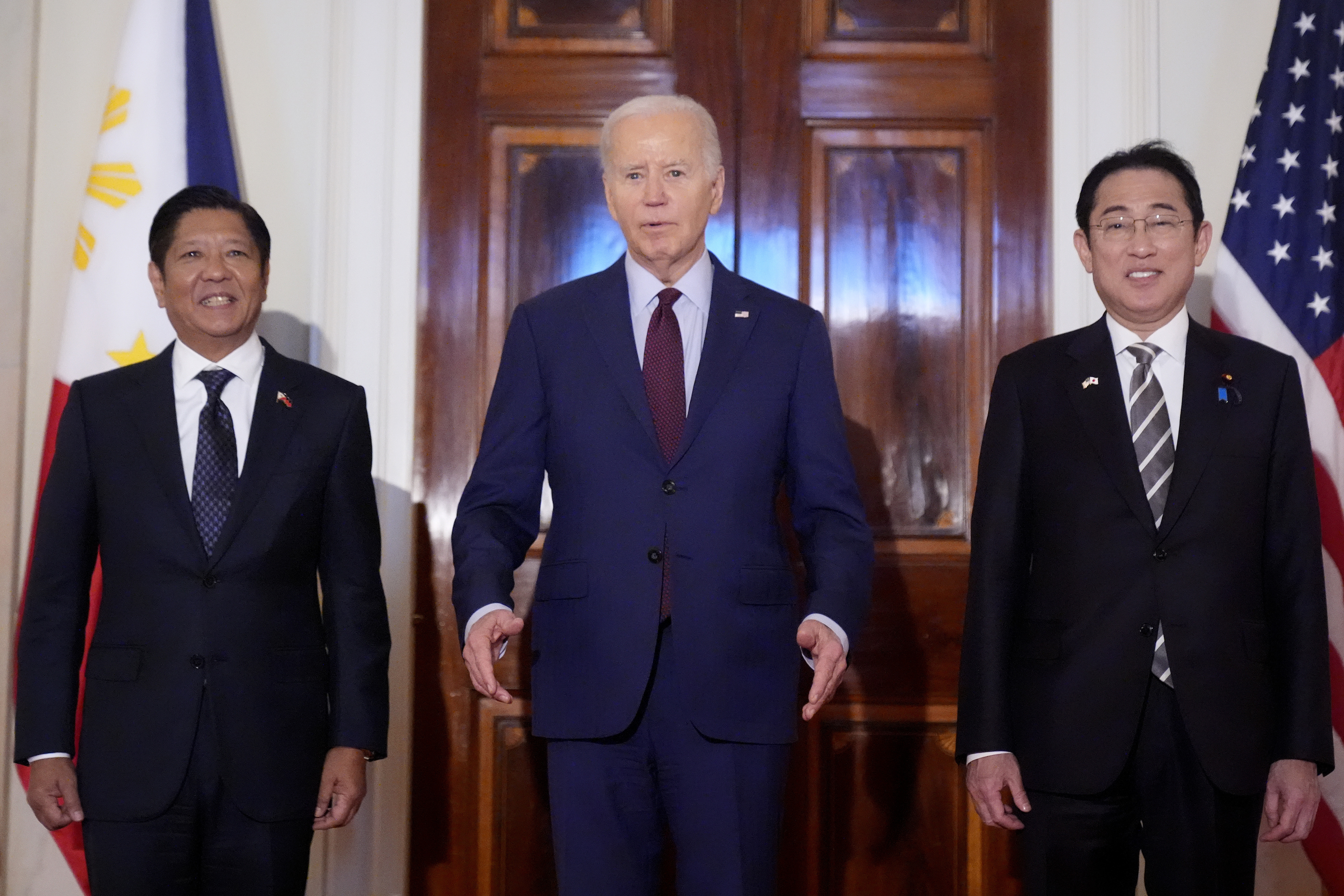
The first ever trilateral summit among the Philippines, Japan and the United States has escalated rather than defusing the tension over the South China Sea, and even ‘hardened’ the stance of the parties involved in otherwise calm waterway, analysts said.
The Philippines involvement in the “provocative” April 11 summit has also made the country an “outlier” in the Association of Southeast Asian Nations, as member states of the regional bloc prefer a “nuanced” approach in resolving the dispute over the South China Sea.
Lucio Blanco Pitlo III, research fellow at the Manila-based Asia-Pacific Pathways to Progress Foundation, said the trilateral summit did not aid in de-escalating tensions but rather contributed to hardening the positions of the parties to the dispute
US President Joe Biden hosted a summit in Washington DC, where he met up with Japanese Prime Minister Fumio Kishida and Philippine President Ferdinand Marcos Jr. In a joint statement issued at the conclusion of the summit, the three leaders committed to develop a partnership on inclusive growth, infrastructure and investment, emerging technologies, clean energy and security.
However, a readout issued after the summit quoted US President Joe Biden as saying that the summit reinforced the ironclad US alliance commitment to the Philippines under the US-Philippines Mutual Defense Treaty and that this “extends to armed attacks on Philippine armed forces, public vessels, or aircraft—to include those of its Coast Guard— in the Pacific, including anywhere in the South China Sea”.
Lucio Blanco Pitlo III, research fellow at the Manila-based Asia-Pacific Pathways to Progress Foundation, said the trilateral summit did not aid in de-escalating tensions but rather contributed to hardening the positions of the parties to the dispute.
Pitlo said cited the joint maritime exercise held April 7 in the South China Sea by Australia, Japan, the Philippines and the US, and how China announced that it would undertake similar drills and dispatch assets to tail the allied activity. He said that with more allied sails coming and China responding accordingly, “the risk of accident and calculation in choppy waters rises”.
Anna Rosario Malindog-Uy, vice-president for external affairs of the Asian Century Philippines Strategic Studies Institute (ACPSSI), said the trilateral alliance is “in many ways, provocative”. She said it could exacerbate regional tensions, spur an arms race and threaten peace and stability in Asia-Pacific.
Malindog-Uy said the statement “could be interpreted as intentionally broad, vague, and, for the most part, problematic”. “I think the Americans purposely phrase it this way to avoid accountability and to have more flexibility,” she said.
Malindog-Uy said the exact definition of the phrase and what constitutes an "armed attack" can be subject to interpretation and could vary according to the situation, possibly including, but not limited to, direct military action.
“On the other hand, in this context, the phrase "anywhere in the South China Sea" might be intended to affirm a seemingly strong stance on defending the US's treaty obligations to the Philippines without specifically challenging the claims of other countries. However, other claimant states could interpret such a statement as disregarding their territorial claims or intending to interfere in regional matters,” she said.
Bilveer Singh, associate professor of political science at the National University of Singapore, said that by joining summit, the Philippines has “militarized” its position over the South China Sea.
Singh said the Philippines is “isolated” in ASEAN because it adopts a confrontational towards China, and has used the US as a “truncheon”.
“Most ASEAN countries have a more sophisticated, nuanced approach to China,” Singh told China Daily He said that ASEAN countries put more emphasis on dialogue, collaboration and trade expansion. He said ASEAN-China relations goes beyond the dispute over the South China Sea.
Pitlo said that while the trilateral summit will strengthen security and economic ties among the three countries, some member states of the Association Southeast Asian Nations (ASEAN) may view this as proof that the Philippines is leaning on the US and Japan to counter China and will undermine ASEAN’s cohesion in shaping the region’s security architecture.
Malindog-Uy said the Philippines is being viewed by other ASEAN countries a “pawn of US interests in the region” owing to its “belligerent stance and approach” toward China and its involvement in this trilateral alliance.
“For ASEAN, a bloc that prides itself on diplomacy, this trilateral alliance between Japan, the Philippines, and the US could be detrimental to regional equilibrium and undermine ASEAN’s centrality in managing regional security issues,” Malindog-Uy told China Daily.
The US, Japanese and Philippine leaders’ statement also said they have “serious concerns” about China’s “dangerous and aggressive behavior” in the South China Sea.
Malindog-Uy said trilateral security agreement will further aggravate the division between China and the US and intensify the already polarized global power dynamics and world order.
“Such polarization may not only hinder cooperation on global challenges that require collective action, such as climate change, global food insecurity problems, or pandemics, but may also steer the dawn of Cold War version 2.0, escalating great power competition, rivalry and bloc confrontation,” she said.


